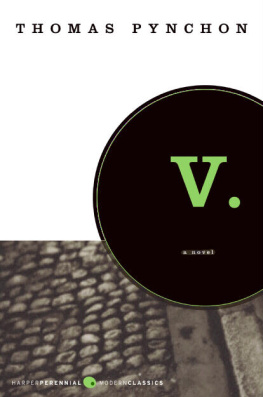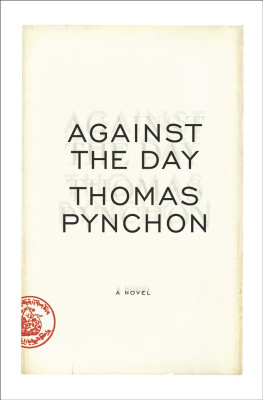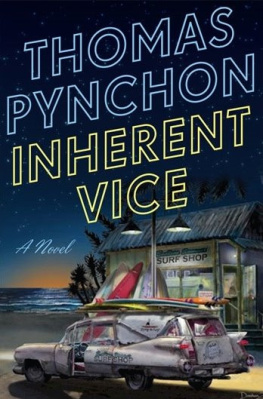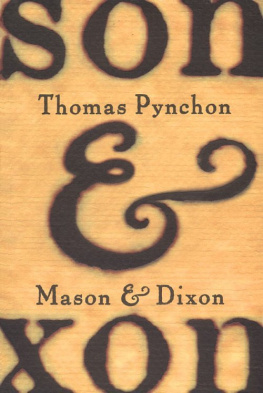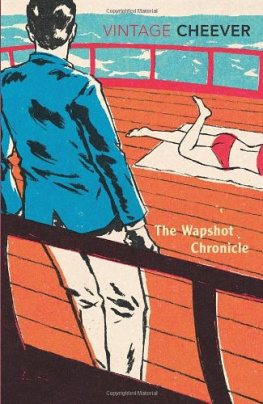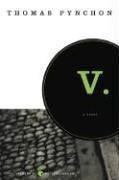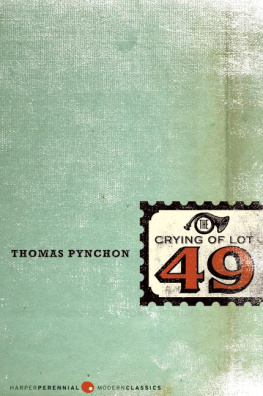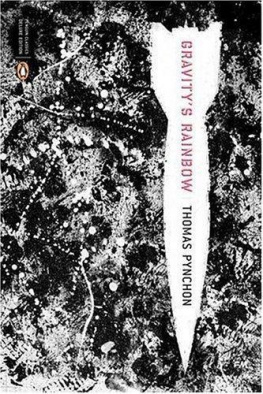Thomas Pynchon - V. (Perennial Classics)
Here you can read online Thomas Pynchon - V. (Perennial Classics) full text of the book (entire story) in english for free. Download pdf and epub, get meaning, cover and reviews about this ebook. year: 1999, publisher: Harper Perennial Modern Classics, genre: Detective and thriller. Description of the work, (preface) as well as reviews are available. Best literature library LitArk.com created for fans of good reading and offers a wide selection of genres:
Romance novel
Science fiction
Adventure
Detective
Science
History
Home and family
Prose
Art
Politics
Computer
Non-fiction
Religion
Business
Children
Humor
Choose a favorite category and find really read worthwhile books. Enjoy immersion in the world of imagination, feel the emotions of the characters or learn something new for yourself, make an fascinating discovery.
- Book:V. (Perennial Classics)
- Author:
- Publisher:Harper Perennial Modern Classics
- Genre:
- Year:1999
- Rating:3 / 5
- Favourites:Add to favourites
- Your mark:
- 60
- 1
- 2
- 3
- 4
- 5
V. (Perennial Classics): summary, description and annotation
We offer to read an annotation, description, summary or preface (depends on what the author of the book "V. (Perennial Classics)" wrote himself). If you haven't found the necessary information about the book — write in the comments, we will try to find it.
V. (Perennial Classics) — read online for free the complete book (whole text) full work
Below is the text of the book, divided by pages. System saving the place of the last page read, allows you to conveniently read the book "V. (Perennial Classics)" online for free, without having to search again every time where you left off. Put a bookmark, and you can go to the page where you finished reading at any time.
Font size:
Interval:
Bookmark:
THOMAS PYNCHON
A Novel
V.
Thomas Pynchon was born in 1937 and attended Cornell University, where he published his first story, "Mortality and Mercy in Vienna," in Epoch. Soon after leaving Cornell, he published three short stories - "Under the Rose," in Noble Savage #3; "Entropy," in The Kenyan Review; and "Low-Lands," in New World Writing #16 - which earned him an immediate reputation among the narrow but intense circle of short-story readers. His novel V. won the Faulkner Prize as the best first novel of 1963. A second novel, The Crying of Lot 49, was published in 1966. Since then he has published "The Secret Investigation" in The Saturday Evening Post, and an essay on Los Angeles in The New York Times Magazine.
In these few published works, Pynchon has earned a widespread and even fanatic acclaim, and remains a uniquely forceful figure on the American literary horizon:
"Pynchon surely ranks as the most intelligent, most audacious and most accomplished American novelist writing today." - The Nation
Copyright (c) 1961, 1963, by Thomas Pynchon.
chapter one
In which Benny Profane, a schlemihl and human yo-yo, gets to an apocheir
Christmas Eve, 1955, Benny Profane, wearing black levis, suede jacket, sneakers and big cowboy hat, happened to pass through Norfolk, Virginia. Given to sentimental impulses, he thought he'd look in on the Sailor's Grave, his old tin can's tavern on East Main Street. He got there by way of the Arcade, at the East Main end of which sat an old street singer with a guitar and an empty Sterno can for donations. Out in the street a chief yeoman was trying to urinate in the gas tank of a '54 Packard Patrician and five or six seamen apprentice were standing around giving encouragement. The old man was singing, in a fine, firm baritone:
Every night is Christmas Eve on old East Main,
Sailors and their sweethearts all agree.
Neon signs of red and green
Shine upon the friendly scene,
Welcoming you in from off the sea.
Santa's bag is filled with all your dreams come true:
Nickel beers that sparkle like champagne,
Barmaids who all love to screw,
All of them reminding you
It's Christmas Eve on old East Main.
"Yay chief," yelled a seaman deuce. Profane rounded the corner. With its usual lack of warning, East Main was on him.
Since his discharge from the Navy Profane had been road-laboring and when there wasn't work just traveling, up and down the east coast like a yo-yo; and this had been going on for maybe a year and a half. After that long of more named pavements than he'd care to count, Profane had grown a little leery of streets, especially streets like this. They had in fact all fused into a single abstracted Street, which come the full moon he would have nightmares about: East Main, a ghetto for Drunken Sailors nobody knew what to Do With, sprang on your nerves with all the abruptness of a normal night's dream turning to nightmare. Dog into wolf, light into twilight, emptiness into waiting presence, here were your underage Marine barfing in the street, barmaid with a ship's propeller tattooed on each buttock, one potential berserk studying the best technique for jumping through a plate glass window (when to scream Geronimo? before or after the glass breaks?), a drunken deck ape crying back in the alley because last time the SP's caught him like this they put him in a strait jacket. Underfoot, now and again, came vibration in the sidewalk from an SP streetlights away, beating out a Hey Rube with his night stick; overhead, turning everybody's face green and ugly, shone mercury-vapor lamps, receding in an asymmetric V to the east where it's dark and there are no more bars.
Arriving at the Sailor's Grave, Profane found a small fight in progress between sailors and jarheads. He stood in the doorway a moment watching; then realizing he had one foot in the Grave anyway, dived out of the way of the fight and lay more or less doggo near the brass rail.
"Why can't man live in peace with his fellow man," wondered a voice behind Profane's left ear. It was Beatrice the barmaid, sweetheart of DesDiv 22, not to mention Profane's old ship, the destroyer U.S.S. Scaffold. "Benny," she cried. They became tender, meeting again after so long. Profane began to draw in the sawdust hearts, arrows through them, sea gulls carrying a banner in their beaks which read Dear Beatrice.
The Scaffold-boat's crew were absent, this tin can having got under way for the Mediterranean two evenings ago amid a storm of bitching from the crew which was heard out in the cloudy Roads (so the yarn went) like voices off a ghost ship; heard as far away as Little Creek. Accordingly, there were a few more barmaids than usual tonight, working tables all up and down East Main. For it's said (and not without reason) that no sooner does a ship like the Scaffold single up all lines than certain Navy wives are out of their civvies and into barmaid uniform, flexing their beer-carrying arms and practicing a hooker's sweet smile; even as the N.O.B. band is playing Auld Lang Syne and the destroyers are blowing stacks in black flakes all over the cuckolds-to-be standing manly at attention, taking leave with rue and a tiny grin.
Beatrice brought beer. There was a piercing yelp from one of the back tables, she flinched, beer slopped over the edge of the glass.
"God," she said, "it's Ploy again." Ploy was now an engineman on the mine sweeper Impulsive and a scandal the length of East Main. He stood five feet nothing in sea boots and was always picking fights with the biggest people on the ship, knowing they would never take him seriously. Ten months ago (just before he'd transferred off the Scaffold) the Navy had decided to remove all of Ploy's teeth. Incensed, Ploy managed to punch his way through a chief corpsman and two dental officers before it was decided he was in earnest about keeping his teeth. "But think," the officers shouted, trying not to laugh, fending off his tiny fists: "root canal work, gum abscesses..." "No," screamed Ploy. They finally had to hit him in the bicep with a Pentothal injection. On waking up, Ploy saw apocalypse, screamed lengthy obscenities. For two months he roamed ghastly around the Scaffold, leaping without warning to swing from the overhead like an orangutan, trying to kick officers in the teeth.
He would stand on the fantail and harangue whoever would listen, flannelmouthed through aching gums. When his mouth had healed he was presented with a gleaming, regulation set of upper and lower plates. "Oh God," he bawled, and tried to jump over the side. But was restrained by a gargantuan Negro named Dahoud. "Hey there, little fellow," said Dahoud, picking Ploy up by the head and scrutinizing this convulsion of dungarees and despair whose feet thrashed a yard above the deck. "What do you want to go and do that for?"
"Man, I want to die, is all," cried Ploy.
"Don't you know," said Dahoud, "that life is the most precious possession you have?"
"Ho, ho," said Ploy through his tears. "Why?"
"Because," said Dahoud, "without it, you'd be dead."
"Oh," said Ploy. He thought about this for a week. He calmed down, started to go on liberty again. His transfer to the Impulsive became reality. Soon, after Lights Out, the other snipes began to hear strange grating sounds from the direction of Ploy's rack. This went on for a couple-three weeks until one morning around two somebody turned on the lights in the compartment and there was Ploy, sitting crosslegged on his rack, sharpening his teeth with a small bastard file. Next payday night, Ploy sat at a table in the Sailor's Grave with a bunch of other snipes, quieter than usual. Around eleven, Beatrice swayed by, carrying a tray full of beers. Gleeful, Ploy stuck his head out, opened his jaws wide, and sank his newly-filed dentures into the barmaid's right buttock. Beatrice screamed, glasses flew parabolic and glittering, spraying the Sailor's Grave with watery beer.
Next pageFont size:
Interval:
Bookmark:
Similar books «V. (Perennial Classics)»
Look at similar books to V. (Perennial Classics). We have selected literature similar in name and meaning in the hope of providing readers with more options to find new, interesting, not yet read works.
Discussion, reviews of the book V. (Perennial Classics) and just readers' own opinions. Leave your comments, write what you think about the work, its meaning or the main characters. Specify what exactly you liked and what you didn't like, and why you think so.

